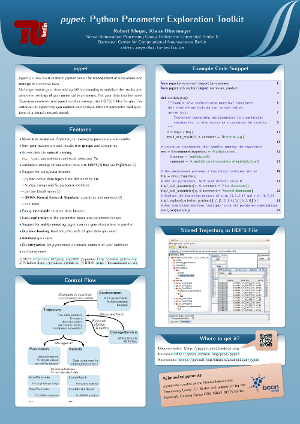Publication Information¶
Citation Policy¶
If you use pypet in your research, it would be very kind of you to cite this in your amazing work. A research article about pypet is currently in preparation which will be the basis for citations in the future. In the meantime you can cite the software as given below. For bibtex you can use:
@misc{rmeyer2016,
author = {Robert Meyer and Klaus Obermayer},
year = {2016},
title = {pypet: {T}he {P}ython {P}arameter {E}xploration {T}oolkit},
note = {\url{http://pypet.readthedocs.org/}},
institution = {Technische Universität Berlin, Neural Information Processing Group}
}
Otherwise you can cite it as:
- Robert Meyer and Klaus Obermayer. pypet: The Python Parameter Exploration Toolkit, 2015. http://pypet.readthedocs.org/.
Brain Days and EuroPython Poster¶
There is a poster about pypet that was shown at the Berlin Brain Days 2013 and the EuroPython 2014.

Download:
Acknowledgments¶
Thanks to Robert Pröpper and Philipp Meier for answering all my python questions
You might want to check out their SpykeViewer tool for visualization of MEA recordings and NEO data
Thanks to Owen Mackwood for his SNEP toolbox which provided the initial ideas for this project
Thanks to Mehmet Nevvaf Timur for his work on the SCOOP integration and the
'NETQUEUE'feature.Thanks to the BCCN Berlin, the Research Training Group GRK 1589/1, and the Neural Information Processing Group for support
Tests¶
Tests can be found in pypet/tests.
Note that they involve heavy file IO and you need privileges
to write files to a temporary folder.
The test suites will make use of the tempfile.gettempdir() function to
create such a temporary folder.
Each test module can be run individually, for instance $ python trajectory_test.py.
You can run all tests with $ python all_tests.py which can also be found under
pypet/tests.
You can pass additional arguments as $ python all_tests.py -k --folder=myfolder/
with -k to keep the HDF5 and log files created by the tests
(if you want to inspect them, otherwise they will be deleted after the completed tests),
and --folder= to specify a folder where to store the HDF5 files instead of the temporary one.
If the folder cannot be created, the program defaults to tempfile.gettempdir().
If you do not want to browse to your installation folder, you can also download the
all_tests.py script.
Running all tests can take up to 20 minutes and might temporarily take up to 1 GB of disk space. The test suite encompasses more than 900 tests and has a code coverage of about 90%!
pypet is constantly tested with Python 2.6, 2.7, 3.3, 3.4, and 3.5 for Linux using Travis-CI. Testing for Windows platforms is performed via Appveyor. The source code is available at github.com/SmokinCaterpillar/pypet.